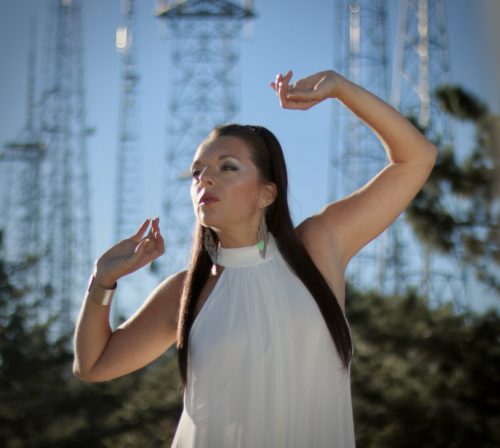Annalisa Giolo Dunker, better known as Inanna, is an environmental singer, creator, belly dancer, and advocate who creates music that transcends genres and categories. Best described as artistic projects that intertwine modern alternative pop and traditional Middle Eastern influences, Inanna’s music advocates for the fundamental value of nature, animals, and the Earth. She creates music that inspires hope in the midst of our bleak climate crisis and galvanizes individuals to take action. Born in Italy and having pursued various musical projects in Italy and Spain, Inanna is now based in Los Angeles where she continues to create art and advocate for the Earth.

We corresponded with Inanna to hear about her cultural influences, ecological messages, and push for environmental action.
ClimateMusic: The name Inanna is a tribute to the ancient Sumerian goddess of love and fertility, as well as of war. Could you describe what drew you to adopt her name for your blend of environmental, ethnic, and alternative pop music? What inspired you to enter and shape the eco-alternative pop scene?
INANNA: Hello everyone! When I decided to dedicate my music entirely to environmental issues and the future of the planet, I immediately thought of becoming a “bigger”, exaggerated version of myself: I felt that my birth name and persona were too “small” to contain these enormous topics, so I decided to choose the name of an ancient goddess (and a powerful one) to be able to sustain the task of witnessing and singing about the future of nature. Also, I wanted to give a timeless touch to the project as a whole. All I talk about in my music has to do with deep time and the long history of the Earth. I chose the goddess Inanna because of her duality: she was indeed the goddess of love, harvest and fertility, but she was also the goddess of war and justice. Through this music project I wanted to be a witness of the darkness and the planetary drama we are living, witness the fear of incomparable loss, but I also wanted to encourage to have hope, to create a new narrative for the future, and to feel empowered through the things we CAN do and CAN change right now.
ClimateMusic: Through your music and work, you aim to give a prominent voice to the Earth and to Nature. In this work, why is it important to you to shed light on the interrelations between the environment, humanity, music, and technology? How has this interconnected web shaped your perspective on our environmental crises and the actions we need to take to address them?
INANNA: One of the most important roles of all forms of art is to make the invisible visible. That is why I dedicate all my songs to all kinds of different environmental or animalist issues, or why I reflect on our relationship with nature and the planet. Music, and all arts, have the capacity to speak directly to our souls, through all the layers – conscious or not – of our history and experiences. As the need for environmental issues to have a central role in our culture grows, making activist music has become an imperative for me.
My perspectives and experiences on the environmental crises, on nature and animal rights have shaped me and my music, but it is curious to see how – vice versa – my own work is shaping my perspectives too: as I explore more and more facts, opinions, people’s attitudes, fans’ reactions and as I dive deeper in music activism, my view is shifting from hopelessness to hope, from powerlessness to a feeling of empowerment, from loneliness to perceiving the potential of collectivity.

ClimateMusic: Your music also has strong Middle Eastern influences in its sound, as well as in its visualization through your music videos. How did you come to incorporate ancient Middle Eastern beats and sounds with modern electronic rhythms? How has this musical blend allowed you to convey your message of urgency and hope for Nature’s future?
INANNA: My love and admiration for Middle-Eastern music (especially Egyptian) started around 2006, when I had recently started taking belly dance lessons. I found a world I almost felt nostalgic about, even if I had never known it before. Something connects me deeply with Middle-Eastern sounds and atmospheres: it feels like home, and I don’t know why, as I don’t have any family or relatives in the Middle-East. I eventually became a belly dance instructor and I studied Egyptian dance and folklore for many years in Italy, Spain and Cairo.
When I finally started to produce music on my own, without the help of another producer, I felt I wanted to pour all myself and all my passions into my work: I took my love for alternative music, belly dance, nature and animals and shook it all together, creating a special blend that I like calling “eco-ethno-alt-pop”.
The presence of ethnic sounds and ancient instruments also helped to create that timeless feel I was looking for (together with imagery, name, clothing, etc). In order to convey my message and be able to touch on such gigantic topics, I wanted to show inanna’s duality in everything: light and dark, old and new, East and West, acoustic and electronic.
ClimateMusic: Throughout your album Acrotopia, which was released in 2021, and the two singles Collapse of an Empire and The Battle, which were released earlier this year, your songs have had consistent themes and sounds that evoke both darkness and hope, destruction and healing, extinction and greenery. How have you seen your art impact audiences and inspire environmental action for individuals and communities?
INANNA: When I started this project, I knew I wanted to reach people’s sensibilities and affection towards the Earth, animals and the natural world. I knew I wanted to promote a necessary alliance, among all beings, to save what we can still save of nature’s unique abundance. But I didn’t know, in practice, how I would reach people, how they would react and respond to my message, music and imagery. I am so grateful for the fantastic response this project has received so far, for the numerous messages I receive from fans sharing their views, sharing facts or suggestions, asking me about plant-based recipes or thanking me for speaking up for the planet. Making a small difference sometimes can be huge, as it creates a ripple effect and the synergy to promote bigger changes. Seeing how even just one song can speak to someone so deeply, makes all the effort worth it.

ClimateMusic: You’ve also been able to engage in advocacy and activism work by organizing your own veganism and environmentalism initiatives, such as Better Earth Media, as well as by supporting the organization Music Declares Emergency. What do you envision for the future of our collective climate policies and sustainability culture? What do you personally hope to see come to fruition to address our environmental crises?
INANNA: I have seen many changes happening in the past few years within the intersection between arts and environmentalism. So many initiatives have sprung since 2019 and so many more are on the way. Many artists have decided to speak up and use their stages and platforms to promote change, alone or through organizations.
As a collective, I hope that in the next 5 years – crucial years – we will see drastic changes in the ways we produce and consume goods and in the way we make energy. We need to vote for charismatic leaders who will have the courage to make bold changes in a very short span of time (end oil drilling, end factory farming and fish farming, close coal plants, ban single plastic use everywhere, protect nature and wildlife, recognize ecocide and promote rewilding).
But there is so much we can do as individuals, and grassroot changes and movements create better conditions and a solid ground for all the “changes from above”.
Among the most powerful things we can do as humans to immediately and very effectively reduce our environmental impact is adopting a plant-based diet. Whoever can do it, should do it. It is so powerful and I wish everyone could do it right away, it would make a HUGE difference for the future of nature and all species! It is so easy to make the shift these days. Eating plant-based is also a much healthier choice for our bodies and it reduces animal suffering immensely (worldwide, we slaughter more than 70 BILLION land animals per year, and TRILLIONS fish: this cannot be sustainable – or ethical in any way).
We must also encourage second-hand, swap and recycle culture: the “always-new”, “always-more”, the “single-use” are old news, and they are just not cool anymore. What’s good for the planet and the future of all earthlings is the new cool.
ClimateMusic: How can we stay up to date with all of your music and advocacy work?
INANNA: You can find everything and all useful links on my website (www.inannamusic.com). On social media, I am most active on Instagram these days. See you all there!
Thank you so much for all you do and for including me in your Climate Music Artist Spotlight Series!